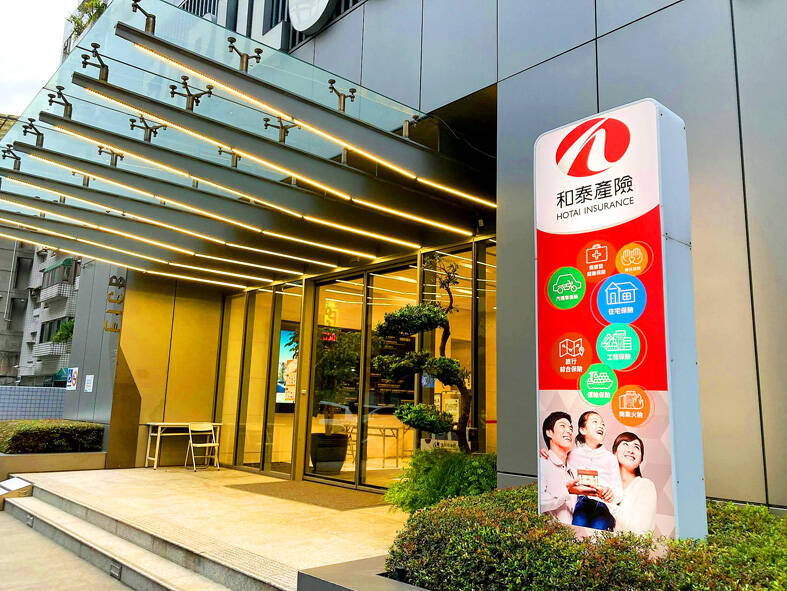The Financial Supervisory Commission (FSC) on Thursday ordered four non-life insurance companies to raise new capital by the end of June after their capital solvency conditions worsened due to massive COVID-19 insurance policy payments.
At the end of last year, CTBC Insurance Co (中國信託產險), Fubon Insurance Co (富邦產險), Tokio Marine Newa Insurance Corp (新安東京海上產險) and Hotai Insurance Co (和泰產險) failed to meet risk-based capital (RBC) ratios, the commission said.
The FSC uses the ratio to gauge an insurer’s capital adequacy, setting 50 percent as the regulatory minimum and 200 percent as a healthy level.

Photo courtesy of Hotai Insurance Co
All four insurers’ RBC ratios fell into negative territory at the end of last year, as they suffered heavy losses due to massive compensation to COVID-19 policyholders, the commission said.
The four companies must restore their solvency levels by raising fresh capital by the end of June, or they would be taken over by the commission within 90 days, it said.
Fubon Insurance had an RBC ratio of minus-37.25 percent, while Hotai Insurance had an RBC ratio of minus-321 percent, Tokio Marine Newa Insurance minus-1,078 percent and CTBC Insurance minus-1,680 percent, FSC data showed.
Fubon Insurance’s board of directors yesterday approved a plan to issue 1 billion new common shares via a private placement, as the insurer’s accumulated losses have exceeded half of its share capital, its parent Fubon Financial Holding Co (富邦金控) said in a statement to the Taiwan Stock Exchange.
Fubon Insurance aims to raise NT$16 billion this time after a capital injection of NT$15 billion in August last year to address the problem.
Hotai Insurance plans to scrap NT$4.5 billion from its share capital to absorb losses and then raise NT$4.5 billion by issuing 450 million common shares via a private placement to improve its financial status, its parent Hotai Motor Co (和泰汽車) said in a filing to the Taiwan Stock Exchange yesterday.
Hotai Insurance last year raised NT$20 billion and NT$6 billion after two separate share issues.
Another insurer, Chung Kuo Insurance Co (兆豐產險), had an RBC ratio of minus-8.8 percent at the end of last year, but was able to restore it to 200 percent after a fresh capital injection of NT$6 billion, the commission said.
Overall, the nation’s six major non-life insurers that sold a majority of the COVID-19 insurance policies have raised fresh capital of NT$112.5 billion to increase their adequacy ratios, the commission’s data showed.
Meanwhile, Mercuries Life Insurance Co (三商美邦人壽保險) and Hontai Life Insurance Co (宏泰人壽) are required to submit plans to enhance their capital adequacy as their equity-to-assets ratio have slid below 3 percent, the commission added.
The capital inadequacy issues mark the latest challenge facing local insurers after rate hikes and tumbling stock markets.
Additional reporting by Lisa Wang

‘SWASTICAR’: Tesla CEO Elon Musk’s close association with Donald Trump has prompted opponents to brand him a ‘Nazi’ and resulted in a dramatic drop in sales Demonstrators descended on Tesla Inc dealerships across the US, and in Europe and Canada on Saturday to protest company chief Elon Musk, who has amassed extraordinary power as a top adviser to US President Donald Trump. Waving signs with messages such as “Musk is stealing our money” and “Reclaim our country,” the protests largely took place peacefully following fiery episodes of vandalism on Tesla vehicles, dealerships and other facilities in recent weeks that US officials have denounced as terrorism. Hundreds rallied on Saturday outside the Tesla dealership in Manhattan. Some blasted Musk, the world’s richest man, while others demanded the shuttering of his

ADVERSARIES: The new list includes 11 entities in China and one in Taiwan, which is a local branch of Chinese cloud computing firm Inspur Group The US added dozens of entities to a trade blacklist on Tuesday, the US Department of Commerce said, in part to disrupt Beijing’s artificial intelligence (AI) and advanced computing capabilities. The action affects 80 entities from countries including China, the United Arab Emirates and Iran, with the commerce department citing their “activities contrary to US national security and foreign policy.” Those added to the “entity list” are restricted from obtaining US items and technologies without government authorization. “We will not allow adversaries to exploit American technology to bolster their own militaries and threaten American lives,” US Secretary of Commerce Howard Lutnick said. The entities

Minister of Finance Chuang Tsui-yun (莊翠雲) yesterday told lawmakers that she “would not speculate,” but a “response plan” has been prepared in case Taiwan is targeted by US President Donald Trump’s reciprocal tariffs, which are to be announced on Wednesday next week. The Trump administration, including US Secretary of the Treasury Scott Bessent, has said that much of the proposed reciprocal tariffs would focus on the 15 countries that have the highest trade surpluses with the US. Bessent has referred to those countries as the “dirty 15,” but has not named them. Last year, Taiwan’s US$73.9 billion trade surplus with the US

Prices of gasoline and diesel products at domestic gas stations are to fall NT$0.2 and NT$0.1 per liter respectively this week, even though international crude oil prices rose last week, CPC Corp, Taiwan (台灣中油) and Formosa Petrochemical Corp (台塑石化) said yesterday. International crude oil prices continued rising last week, as the US Energy Information Administration reported a larger-than-expected drop in US commercial crude oil inventories, CPC said in a statement. Based on the company’s floating oil price formula, the cost of crude oil rose 2.38 percent last week from a week earlier, it said. News that US President Donald Trump plans a “secondary